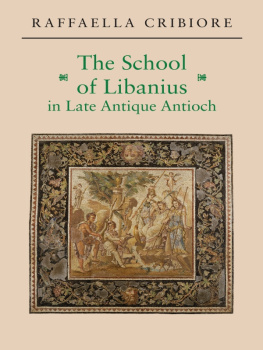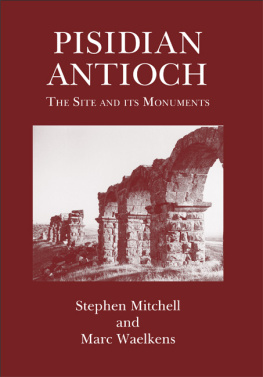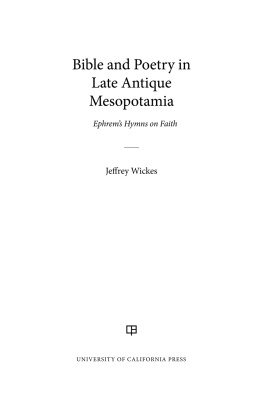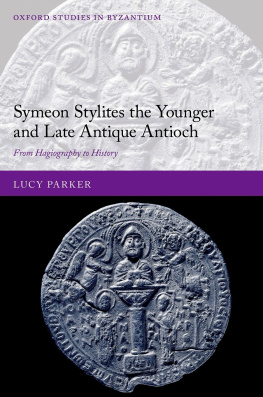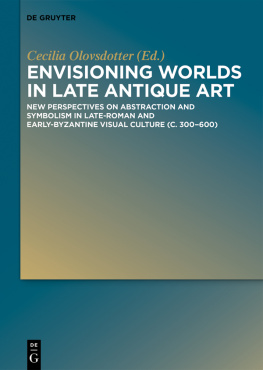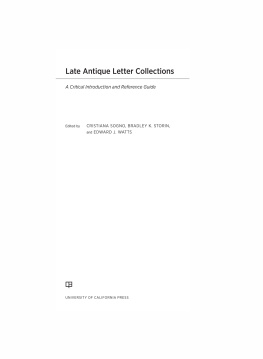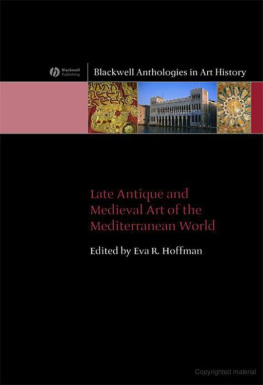Libanius. - The School of Libanius in Late Antique Antioch
Here you can read online Libanius. - The School of Libanius in Late Antique Antioch full text of the book (entire story) in english for free. Download pdf and epub, get meaning, cover and reviews about this ebook. City: Princeton, Turkey--Antioch, year: 2007, publisher: Princeton University Press, genre: Home and family. Description of the work, (preface) as well as reviews are available. Best literature library LitArk.com created for fans of good reading and offers a wide selection of genres:
Romance novel
Science fiction
Adventure
Detective
Science
History
Home and family
Prose
Art
Politics
Computer
Non-fiction
Religion
Business
Children
Humor
Choose a favorite category and find really read worthwhile books. Enjoy immersion in the world of imagination, feel the emotions of the characters or learn something new for yourself, make an fascinating discovery.
- Book:The School of Libanius in Late Antique Antioch
- Author:
- Publisher:Princeton University Press
- Genre:
- Year:2007
- City:Princeton, Turkey--Antioch
- Rating:4 / 5
- Favourites:Add to favourites
- Your mark:
- 80
- 1
- 2
- 3
- 4
- 5
The School of Libanius in Late Antique Antioch: summary, description and annotation
We offer to read an annotation, description, summary or preface (depends on what the author of the book "The School of Libanius in Late Antique Antioch" wrote himself). If you haven't found the necessary information about the book — write in the comments, we will try to find it.
Libanius.: author's other books
Who wrote The School of Libanius in Late Antique Antioch? Find out the surname, the name of the author of the book and a list of all author's works by series.
The School of Libanius in Late Antique Antioch — read online for free the complete book (whole text) full work
Below is the text of the book, divided by pages. System saving the place of the last page read, allows you to conveniently read the book "The School of Libanius in Late Antique Antioch" online for free, without having to search again every time where you left off. Put a bookmark, and you can go to the page where you finished reading at any time.
Font size:
Interval:
Bookmark:
The School of Libanius in Late Antique Antioch

The School of Libanius in Late Antique Antioch
Raffaella Cribiore
PRINCETON UNIVERSITY PRESS
PRINCETON AND OXFORD
Copyright 2007 by Princeton University Press
Published by Princeton University Press, 41 William Street, Princeton, New Jersey 08540
In the United Kingdom: Princeton University Press, 3 Market Place,
Woodstock, Oxfordshire OX20 1SY
All Rights Reserved
Library of Congress Cataloging-in-Publication Data
Cribiore, Raffaella
The school of Libanius in late antique Antioch / Raffaella Cribiore.
v. cm.
Includes bibliographical references and index.
Contents: Libanius and rhetoric in AntiochSchools and Sophists in the Roman East
The networkAdmission and evaluationteaching the logoiThe long and the short path to rhetoricAfter rhetoricConclusion : words and silenceAppendix 1 : the dossiers of studentsAppendix 2 : length of students attendence.
eISBN: 978-1-40082-767-1
1. Libanius. 2. PhilosophyStudy and teachingTurkeyAntiochHistory. I. Title.
B577.L44C75 2007
808.0071'03943dc22 2006013514
British Library Cataloging-in-Publication Data is available
This book has been composed in Sabon
Printed on acid-free paper.
pup.princeton.edu
Printed in the United States of America
10 9 8 7 6 5 4 3 2 1
Ai miei genitori
tanto amati
Contents
Preface
WHEN I WAS writing about Greek education in Egypt in Gymnastics ofthe Mind, I looked for an ancient writer against whom I could test some of the ideas that the papyri suggested. It soon became apparent that Libanius was ideal. The sheer quantity of his writing was daunting at the start, but also tantalizing and promising. When my project reached its end, I was well aware that I had left much behind and that Libanius was still waiting for me. His speeches were extremely useful in helping to trace the story of his famous school in Antioch and of the fluctuating state of rhetoric in the fourth century. His letters captivated me entirely as he truly became part of my life.
I had already written some parts of this book and translated Libaniuss letters (many more than this appendix includes) when I was given the opportunity to spend the fall semester of 2004 at the Institute for Advanced Study in Princeton. I spent a blissful and constructive period there, communicating daily with superb scholars in the company of some great mosaics from Antioch. At the Institute, I was finally able to put into perspective some of the issues that still troubled me. I am very grateful to Glen Bowersock for so generously letting me drink at his spring of excellence in the garden of the Muses (as Libanius would say). I also warmly thank Heinrich von Staden for being there when I needed help. Several people contributed to this book in various ways, by reading the whole manuscript or parts of it, providing valuable criticism, discussing points in the translations, and helping me check the text. Thus I am grateful to Peter Brown, Alan Cameron, Eleanor Dickey, William Frosh, Iannis Papadoyannakis, Robert Penella, Giovanni Ruffini, and Maria Wenglinsky. To my family, love as always.
A Note on References and Abbreviations
JOURNALS AND WORKS are abbreviated as in LAnnee philologique and the American Journal of Archaeology. Ancient authors and their works are abbreviated according to the third edition of the Oxford ClassicalDictionary. Modern works that appear in the Select Bibliography are cited in the text by authors name and date of publication.
The numbers in this study that sometimes follow the names of people who appear in Libaniuss works refer to the prosopography in PLRE I (The Prosopography of the Later Roman Empire, vol. 1: Jones et al. 1971) and occasionally in PLRE II (Martindale 1980). When only one person by a certain name is included in those lists, I provide the page reference. The vast majority of the students and members of their families were not of such a status as to be included in PLRE. It is necessary to refer to them by the numbering used in Seeck 1906, which is the only complete prosopographical work on Libaniuss letters. Thus names that are followed by Roman numerals are included in that work. A double citation (according to both PLRE and Seeck) is used when both prosopographies contain valuable observations.
In the text, I cite Libaniuss letters that appear in Appendix One by the numbering (in bold characters) used there. I refer to other letters of Libanius by citing the numbering in Foersters edition (190327). References to translations in Norman 1992 (N) and Bradbury 2004a (B) are given according to the numbering in these collections.
The School of Libanius in Late Antique Antioch
Introduction
THE SOPHIST LIBANIUS, who was an exponent of the revival of Greek literature that started with the Second Sophistic, taught in Antioch in Syria in the fourth century C.E. In Oration 55, he extolled to a student the advantages of a career as a teacher of rhetoric:
Howgreat it is to rule overwellborn young men and see them improve in rhetoric and proceed to the various paths of life! And what about the honors one receives from them and their fathers, from citizens and foreigners? Teachers of rhetoric are respected by all governors, small and great, and even by emperors. (23)
There are many similar statements in Libanius, as well as fervent commendations of good students. There are an equal number of negative assessments of the condition of rhetorica despised and silent disciplineand condemnations of youths indifferent to its charms. In general, Libaniuss letters present a different view than the orations. In attempting to underutterance, or a private joke between writer and recipient? We arestand the reasons for the discrepancy and to unravel other puzzles that the vast corpus of the rhetors surviving writings presents, this book delves into the workings of the most prominent school of rhetoric in Antioch (the modern Antakya, in south Turkey), where Libanius taught as official sophist of the city.
Libanius kept a vast correspondence to advertise the quality of his teaching and to maintain contacts with the families of his pupils, former students, and a few other teachers. I have included in an appendix translations of about 200 letters that concern his teaching activity. This study, in any case, is based not only on the texts I have translated, but also on all of his correspondence with relevance to education, as well as several of his speeches that pertain to pedagogical issues.
There is more than one Libanius, and this book does not pretend to interpret them all or to solve all the puzzles. The questions I am asking depend on my specific interests and are only tangential to other fundamental questions. By the beginning of the third century, Christianity had gained a hold over the intellectual elite, but Libanius, a major representative of Hellenism when it was starting to break down, was an exponent of paganism, since his fervent belief in classical culture brought with it a religious allegiance.
But even though I concentrate on Libanius as an educator, and the factual claims I make are based on a process of inquiry and the examination of a large body of material, I am aware that I cannot pretend to have captured him fully. Letters manipulate reality no less than do speeches self-consciously composed for public consumption or autobiography. While one should read them (when possible) in conjunction with other writings of an author, it is not always easy to find overall coherence, if that is what one seeks. The farther a reader is from a text, the less competent he is to interpret it,
Next pageFont size:
Interval:
Bookmark:
Similar books «The School of Libanius in Late Antique Antioch»
Look at similar books to The School of Libanius in Late Antique Antioch. We have selected literature similar in name and meaning in the hope of providing readers with more options to find new, interesting, not yet read works.
Discussion, reviews of the book The School of Libanius in Late Antique Antioch and just readers' own opinions. Leave your comments, write what you think about the work, its meaning or the main characters. Specify what exactly you liked and what you didn't like, and why you think so.

